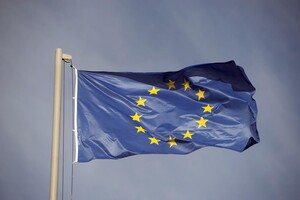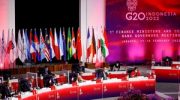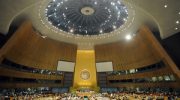It is unlikely that the West can back down in its support for Ukraine – too much is at stake.

Just a week ago, geopolitical balance in Ukraine was possible compared to the zugzwang, the point in the game when any move is likely to go against the player.
For the West, as it prepares to gather with other world leaders at The UN General Assembly in New Yorkseemed to have no choice but to hang on. Patrick Wintour, one of the editors of The Guardian, writes about this.
It is unlikely that the West can back down in its support for Ukraine – too much is at stake. Too much Ukrainian blood has been spilled, too much Western money has been spent, including US$5 billion (£4.27 billion) a month just to finance the viability of the Ukrainian state. The US alone has spent $15.5 billion since the start of the war.
However, if the West continues its plan to put economic pressure on Russia, an increasingly desperate Putin will surely cut off all gas coming from Russia: no only the one that comes through the Nord Stream-1 gas pipeline, but all the pipelines are gone. Given the refusal of oil producers from Saudi Arabia and Iran to come to the aid of Europe and increase production, millions of European consumers are at risk of freezing or going bankrupt this winter.
The cost of protecting the European electorate from rising electricity and gas costs is now estimated at €500bn (£433bn). And it threatens to devastate national budgets as central banks come under pressure to keep raising interest rates to contain inflation at 9.8%, the highest rate in the last 25 years.
Although all these calculations have not disappeared, they have been radically changed as a result of the sudden counteroffensive of the Ukrainian military. Western officials are cautious about the tipping point, but Justin Bronk of the British think tank RUSI (Royal United Services Institute) has already said:
“No matter how much territory Ukraine regains before the weather affects the situation for both sides, there can no longer be any doubt that it can win if it has the right support. The argument that Ukraine should not continue to help because it prolongs the deadlock no longer works. Victory is now obvious and quite likely.”
Annalena Burbok, German Foreign Minister, commenting on Saturday's counteroffensive during her stay in Kyiv, said that it was “a moment hope”. After the next 24 hours of the Ukrainian army's advance, a fierce debate erupted in German politics over the direct supply of heavy weapons, including Leopard tanks. Agnieszka Brugger, deputy head of the Green faction in the Bundestag, said that it is necessary to use all options for such assistance, without any restrictions.
“These are crucial months for the people of Ukraine and order on our continent,” she said.
>
Instead of proposing only a costly impasse in which, as Vladimir Putin says, “European prosperity is thrown into the furnace of sanctions,” Western leaders can now talk about the deoccupation of Ukraine without sounding like fantasy.
“This counteroffensive shows that we can win,” said Ukraine's ambassador to the US, Oksana Markarova. prematurely assumed that autumn could become a “season of victories”. If so, analysts will have to resort to predicting further tough, possibly even nuclear, measures that Putin may take to prevent his own defeat.
But for now, the raging war of narratives will not stop, including next week at the UN, an organization that is itself largely marginalized as a body by Russia's veto in the Security Council. Russian Foreign MinisterSerhii Lavrov will be cornered if current military failures become more evident, but his ability to dismiss all criticism and call black white is legendary.
Ukraine's advancement also < strong>unnerves Beijing, as it promised Russia boundless friendship. As Richard Haas points out, president of the Council on Foreign Relations, “China was meant to divide the West, but its alliance with Russia did the opposite.”
Also read: Putin needs Xi Jinping's help more than ever after Ukraine setbacks – experts
In addition, if China wants to remain an effective counter to the US, one that attracts non-aligned states, it desperately needs Russia, which is making progress in eastern Ukraine. China's President Xi Jinping will lose the most from the Russian defeat, in terms of prestige at the UN.
But even now, Western leaders are anxiously peering out of their cozy offices for signs of whether Europe will hold out or go the other way. The pressure is still not easing.
Natalie Tocci, director of the Italian Institute of International Relations, claims that this process is a struggle between two opposing views on the stability of Europe: one is held by Putin, and another – Jean Monnet, the spiritual founder of the EU.
Putin, she says, assumes that the prosperous but morally corrupt liberal democracies of Western Europe will eventually prove their inability to tolerate pain. He cannot imagine a Europe that, like a suicide, throws itself on the economic cliff for the sake of a country “which in its thoughts does not even exist.” On the contrary, Monnet claimed in his memoirs that Europe's strength “is forged in crises and will be the sum of decisions made during these crises.”
Every time Europe is challenged and falls, be it Covid or the Euro, it not only rises but moves forward to the next stage of adaptation and integration, thus turning the crisis into an opportunity. Tocci argues that it is still impossible to say which interpretation of European resilience will ultimately prevail.
Moscow's disinformation units, of course, like to project Europe in a state of rebellion against rising prices and the indifference of its elites.< /p>
On September 3 in Prague, 70,000 people came to Wenceslas Square to protest against price increases. Pro-Western Prime Minister Piotr Fiala called the organizers “Putin's fifth column, who believe in solving the problem of energy prices by leaving NATO and the EU.” In turn, Pavel Blazek, the Minister of Justice, said that the crowd was not Putin fanatics, but “people concerned about the decline in living standards who deserve to be taken seriously.” The organizers have already announced that the next demonstration of Czechia First is planned for the end of this month. Their slogan is simple: “This is not our war.”
The governmentSlovakia is teetering on the edge, but mainly due to internal problems, and in the parliamentary elections in Italy and Sweden, active right-wing populists played on the consequences of the war, albeit indirectly. Support for Ukraine in the USA is mostly bipartisan and few American politicians want to distance themselves from what looks like US military success.
In general, the Eurobaromoter survey, conducted in June and July, showed that 68% of Europeans support the supply of arms to Ukraine, and 78% support economic sanctions imposed by the EU against the Russian government, companies and individuals.
The latest ZDF polls in Germany showed that 70% support sanctions against Russia. The highest level of support — 90% — is shown by supporters of the Greens. The first attempt of the German left to start a “hot autumn” ended in failure: few Germans responded to the call to take to the streets of Cologne.
Read also: Putin has suffered an absolute failure, even countries dependent on Russian energy carriers have opposed him – Forbes
Moscow propagandists will try to portray Europe on the verge of an 1848-style uprising, and NATO will resist these crazy attempts of those locked in their own people's fantasies.
Everything will depend on the effectiveness of the measures that the EU can agree on to limit gas prices or subsidize costs. No one denies that this issue is extremely politically sensitive.
But what has been most diplomatically significant over the past month is that European leaders, after a sharply divided initial reaction to the invasion in early spring, appear to have regained their nerve, and have done so even before Ukraine's recent dramatic counterattacks.
/p>
In a series of frankly reflective speeches over the past month, leaders in Paris, Brussels, Berlin and Washington have shown themselves resilient and motivated, ready to commit themselves ideologically to a war that will last at least until the winter. The speeches may have been partly a diplomatic offensive by Berlin and Paris to reassure the Baltic states and Eastern Europe, but they were also a message of determination that politicians were sending to their electorates.
Burbock, for example, an article in Die Zeit claimed:
“We must face the facts: this Russia will remain a threat to peace and security in Europe for the foreseeable future. It may be difficult to accept, but we must prepare for the fact that next summer Ukraine will still need new heavy weapons from its friends.”
Later, she said that she would keep her promises to Ukraine, no matter what the voters thought.
In the same way, German Chancellor Olaf Scholz, in a big speech delivered in Prague on August 29, tried to lay the foundations for a deep renewal of Germany's European policy. It ended with a rhetorical question:
“When, if not now, will we build a sovereign Europe? Who, if not us, can protect the values of Europe?”.
Macron, in a speech to the French ambassadors on September 1, also admitted that there is no going back with Putin. This confession requires him to directly admit that the bet he made on the rapprochement of Russia with Europe, the symbol of which is the Fort de Summit in Bregançon in 2019, has not played out.
Read also: Predictions about Putin's collapse are greatly exaggerated – FP expert
Yes, he still emphasizes France's freedom of maneuver vis-à-vis the US and China. He won't apologize for talking to Putin because, if he hadn't, Putin's only interlocutor would have been Turkey, and he's kept quiet about whether Putin deserves the humiliation he spoke out against in May.< /p>
Read also: Macron promises to prevent Russia from winning the war in Ukraine
It seemed as if his belated visit to Kyiv on June 16 with the Italian Prime Minister Mario Draghi and Scholzem, where the leaders called to allow Ukraine and Moldova to start the EU application process, finally changed it. He defines the Russian invasion in the context of the challenge to liberalism as “the undisputed model and culmination of humanity”.
According to him, Russia “not only undermined the principles on which we built peace for decades – the territorial integrity of states,” but created modern relativism, which risks becoming “completely irreversible” and “extremely dangerous for democracy.” As Macron emphasized, this is not a war for territory or Ukrainian nationalism, but for values.
However, the analysis of these speeches, which few have read, is also a clear recognition of the weakness of liberal democracy. Burbokshe was as frank as possible in her conversation with her ambassadors. She said that while 141 countries condemned Russia's invasion at the UN in March, the truth is that “countries representing more than half the world's population did not vote with us. In addition, many countries do not support sanctions against Russia.”
In addition to the suffering of Ukrainians, according to her, “this was the only fact that bothered her the most in the last six months”, so much so that she “does not could have thought about something else”.
According to her, the West needs to “understand why, when there is a choice between right and wrong, between victims and criminals, the country simply refrains”.
Many countries of the world considered the war in Ukraine as a regional one: “They ask again and again where we were when conflicts raged in their homes.”
Her French counterpart Catherine Colonna expressed a similar opinion in her address to the French diplomatic corps, warning:
“The desire to seek compromises is losing ground with each day, facing the desire to impose views without compromise, or to accept a dead end”.
She called for French “combat diplomacy” and for French diplomats to become more articulate in this new “competition of values”.
Macron also noted that the “countries that have abstained” represent a significant part of humanity.
“It means that this part of humanity does not fully understand what is going on.”
He added that the leaders of these countries expressed their disappointment with the West.
“Many people say to us: “What makes this model so great? You look so miserable. We watched what happened in the Capitol last year, we see what is happening in your place, extremism is on the rise everywhere. You cannot solve the problem of extreme poverty. You're arguing about the climate.”
Although Russia was the main conductor of this rhetoric — with its ears sticking out from behind the scenes — he argued that it was China that “structured the camp of those who abstained and sought to advance their interests and to bring about a split in the international order, creating a narrative that says that all these rules are focused on the power of the United States.” such little support for Western values in the new multipolar world raises deep historical questions.
Ukraine is also trying to deepen its international support by expanding diplomatic contacts, but this is a difficult process.
Dmytro Kuleba , Ukraine's foreign minister, admits he is not very popular in India after telling its leadership that the oil they buy from Russia is soaked in Ukrainian blood. As for China, he admits that the progress achieved in this direction is very little.
Related video
Ultimately, if the Western alliance wants to attract new friends, to undo the damage accumulated in the past he will need not only Western-sponsored conferences on climate change, or presidential tours to Africa.


